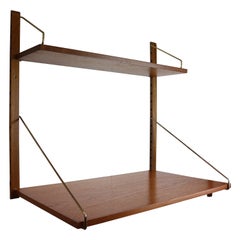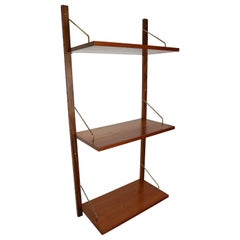Poul Cadovius Shelf Brackets
Recent Sales
Mid-20th Century Danish Scandinavian Modern Shelves
Brass
Mid-20th Century Danish Scandinavian Modern Shelves
Brass
Mid-20th Century Danish Scandinavian Modern Shelves
Brass
Mid-20th Century Danish Scandinavian Modern Shelves
Brass
Mid-20th Century Danish Scandinavian Modern Shelves
Brass
Poul Cadovius Shelf Brackets For Sale on 1stDibs
How Much are Poul Cadovius Shelf Brackets?
Poul Cadovius for sale on 1stDibs
While Poul Cadovius is most famous for his modular floating shelving system, his career in design didn’t actually start with wall units.
Born just outside of Copenhagen in 1911, Cadovius began manufacturing window treatments in the 1940s with his partner, Hother Brønner. He soon turned his focus from Venetian blinds to furniture, finding success designing svelte pieces in teak, a richly colored hardwood favored by the Danish mid-century modernists.
In 1945, Cadovius founded the furniture manufacturer Royal System with his designs, including the 1948 Royal System shelving unit, a space-saving solution that underscored Cadovius’s penchant for problem-solving in a multifunctional way. Rather than balance shelves on wooden or metal legs, it held them to the wall with brackets.
Cadovius followed the Royal System shelving unit with the System Ultra in 1957, the System Cado in 1960 and the System Abstracta, which was installed throughout the exhibition halls of the 1962 Cologne Furniture Fair. All expanded on his idea of wall-mounted shelving that saved space while offering functionality, allowing for limitless combinations of storage, shelves, work surfaces and other units. The Royal System proved to be especially popular and is still produced by Danish furniture brand dk3 today, with early models continuing to be in demand.
Along with the shelving systems, Cadovius designed everything from lounge chairs to mushroom-shaped bus shelters, and he held over 400 patents. In addition to being a designer, he was also an entrepreneur with an eye for opportunity, such as purchasing Danish manufacturer France & Søn in the mid-1960s and folded it into Cado, a company he founded years earlier. He used this as an occasion to experiment with his designs, conceiving such unusual pieces as an aluminum-based dining table topped with rosewood and hand-painted by artist Susan Fjedldoe Mygge.
Cadovius’s innovations in shelving continued throughout his career, with examples like the sculptural Butterfly shelf and vertical pieces mixing shelving and storage. In 2018, to celebrate the 70th anniversary of the Royal System, dk3 reissued the celebrated shelving system as well as a more compact version reimagined for 21st-century homes.
Find a collection of vintage Poul Cadovius storage cabinets, seating and other furniture on 1stDibs.
Finding the Right Storage-case-pieces for You
Of all the vintage storage cabinets and antique case pieces that have become popular in modern interiors over the years, dressers, credenzas and cabinets have long been home staples, perfect for routine storage or protection of personal items.
In the mid-19th century, cabinetmakers would mimic styles originating in the Louis XIV, Louis XV and Louis XVI eras for their dressers, bookshelves and other structures, and, later, simpler, streamlined wood designs allowed these “case pieces” or “case goods” — any furnishing that is unupholstered and has some semblance of a storage component — to blend into the background of any interior.
Mid-century modern furniture enthusiasts will cite the tall modular wall units crafted in teak and other sought-after woods of the era by the likes of George Nelson, Poul Cadovius and Finn Juhl. For these highly customizable furnishings, designers of the day delivered an alternative to big, heavy bookcases by considering the use of space — and, in particular, walls — in new and innovative ways. Mid-century modern credenzas, which, long and low, evolved from tables that were built as early as the 14th century in Italy, typically have no legs or very short legs and have grown in popularity as an alluring storage option over time.
Although the name immediately invokes images of clothing, dressers were initially created in Europe for a much different purpose. This furnishing was initially a flat-surfaced, low-profile side table equipped with a few drawers — a common fixture used to dress and prepare meats in English kitchens throughout the Tudor period. The drawers served as perfect utensil storage. It wasn’t until the design made its way to North America that it became enlarged and equipped with enough space to hold clothing and cosmetics. The very history of case pieces is a testament to their versatility and well-earned place in any room.
In the spirit of positioning your case goods center stage, decluttering can now be design-minded.
A contemporary case piece with open shelving and painted wood details can prove functional as a storage unit as easily as it can a room divider. Alternatively, apothecary cabinets are charming case goods similar in size to early dressers or commodes but with uniquely sized shelving and (often numerous) drawers.
Whether you’re seeking a playful sideboard that features colored glass and metal details, an antique Italian hand-carved storage cabinet or a glass-door vitrine to store and show off your collectibles, there are options for you on 1stDibs.

